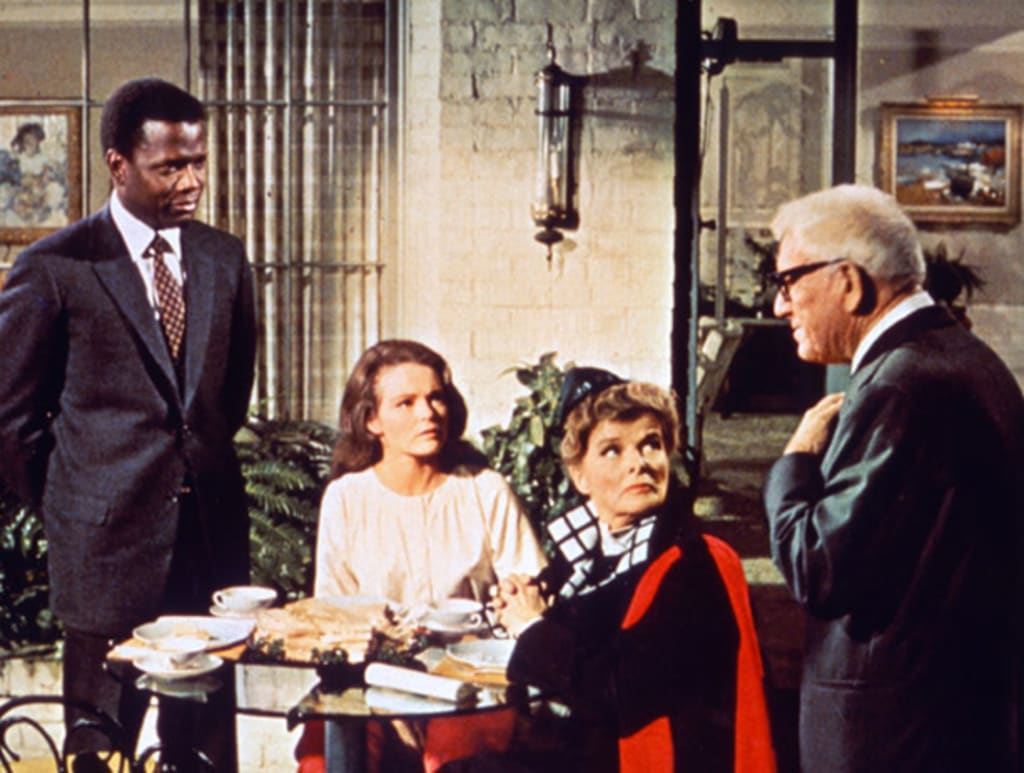Genuine Emotion in Guess Who's Coming to Dinner
An Exploration into How a Movie Reflected a Movement

“You have to give a little, take a little/and let your poor heart break a little/ That’s the story of, that’s the glory of love.”
In the Oscar winning drama Guess Who’s Coming to Dinner, these lyrics, sung several times throughout the course of the film, are a continuous reminder of what the story is really about. Yes, the premise is that a white woman and black man try to seek the approval of their parents for their marriage by dinnertime, but the story is a mantra of what it really means to love and feel emotions truer than any piece of rhetoric ever drawn before.
If you weren’t looking much farther into this film, you might say that it is a specifically accurate way of seeing what race relations were like at the time it was written in the early 1960s. We are constantly reminded of this difficult time in America’s history through other, recently produced movies such as The Help, Lee Daniels’ The Butler, Hairspray, etc., and while these movies do make us aware of how far we have come, they rarely portray such problematic situations in an appropriate way. We are usually treated with the feeling of absolute atrocity, hearing the movie scream at our faces, saying “Look how bad this was! Look at what these people went through!” Then, at the end of the movie, we are faced with a false sense of closure, as if everything was fixed in a short amount of time, and the racism that many cultures endured was small, situational, and contained. However, Guess Who’s Coming to Dinner, by contrast, shows a much truer side to the story. It presents the terrible circumstances featured during this time period as facts, as something the world just had to accept at the time, not as a means to dramatize the story, and this is mostly due to the fact that the film was produced within this time period.
In fact, at first glance, that aspect of this film makes it incredibly outdated. Even by the time it was released, the movie’s line about interracial marriage not being legal in all 50 states of the U.S. became a false one, and there are many other things involved with the story that should make it inaccessible to any twenty-first century American. For instance, in a scene where Matt Drayton, the father of Joanna Drayton, is involved with an car accident, he gives the the driver of the other car 50 dollars to cover the damages, and even goes so far as to say “Buy a new one!” In today’s world 50 dollars is very little, especially in regards to car destruction. Another example of how out of touch the movie would be in today’s world is the premise itself. In modern times, there are much fewer people that would be appalled by an interracial couple than there are people that would be delighted. So, one might ask, if this movie is so outdated, why does it still hold up to today’s standards?
One fairly simple answer that we’ve already briefly suggested is because of the profound statement it was trying to make at the time of its script being written, or rather, its brave step into uncharted territory in terms of how America’s current race relations and political tensions are shown in film. Nevertheless, while this might be an explanation as to why the film is appreciated and exalted by scholars, it still yet doesn’t explain why we thoroughly enjoy it and all of its aspects. Guess Who’s Coming to Dinner is far from perfect (and as we’ve discussed, it is quite dated), and yet it still feels genuine and, somehow, timeless.
This is undoubtedly due to the emotion behind the characters’ actions and dialogue. Yes, we may see the concept of an interracial couple far from a real issue plaguing society today, but, as one watches this movie, it feels personal and relatable because the basic plot structure can be applied to any number of issues that still exist in our world. The story could work out the same way if one person in the couple were a Muslim, a much older age than the other, or if both involved belonged as a part of the LGBTQ+ spectrum. The overall character arcs featured in this film are so universal that the topic of race could practically become inconsequential, and there are several distinct moments in the film that support this.
Firstly, and not far into the film, it is shown that those who have always thought they behave liberally, especially previously mentioned Matt Drayton, still have “knee-jerk” conservative reactions reserved for specific situations, such as when their daughter comes home with a black man. Whether we’d like to admit it or not, we’ve all had thoughts that we didn’t exactly think we were capable of, and they only show up in our most vulnerable moments, when we’d rather them not be there. Anyone would have second thoughts about their child being involved in a type of marriage that is routinely frowned upon by a great deal of people, whether it be in desire to conform with society or in worrying about their well-being and continuous struggle for fair treatment.
Another example is shown towards the end of the movie, and is what I consider the climax in the form of two pivotal scenes. The first is a monologue that Dr. John Prentice delivers to his father, perfectly articulating what every child with an overbearing parent has ever felt, simply stating “...you don't own me! You can't tell me when or where I'm out of line, or try to get me to live my life according to your rules.” The full speech is much more deserved, but this scene is a prime example of universal, relatable appeal exhibited in the movie. You could insert this speech into any piece of literature, film, or other medium and it would make sense because everyone has felt it and knows it better than they know themselves.
The scene immediately afterward sees the, by now, infamously hot-tempered Matt and Dr. Prentice’s mother in a conversation about what they believe is the right path for the couple, and Mrs. Prentice reveals the single most important theme of the movie by telling Drayton that, if he doesn’t believe that Joanna and John should be together, then he clearly doesn’t remember what it’s like to be in love. This is where Matt realizes his mistake and determines that he can’t stand in the way of his daughter’s marriage and that all that truly matters is the love these two people have for each other.
What a powerful, profound statement this was to make towards audiences at the time, and now, we see it as the mantra of the progressive world. “Love knows no bounds,” “‘love is love,” and now “love trumps hate” have become synonymous with equality in the past few years, and who is to stop these from becoming even bigger than they already are. Decades in advance, director Stanley Kramer and writer William Rose tapped into a movement that would change the world so that they could be a part of changing the world then, and I’m sure glad they did it. With support like this at the very base of American society, we can only move towards equality.
Of course, Guess Who’s Coming to Dinner could just be a period piece that helps us restore the faith we have in our nation as a whole, but the emotions featured in it are so precise and true to those we feel every day, that I daresay the world of film wouldn’t be the same today without it.
About the Creator
Dalton Swink
Dalton likes long walks in Half Price Books and the movie section at Best Buy.
Searching for: a career in film.
Has obtained: a mediocre movie collection and the most basic understanding of how cinema can change the world.






Comments
There are no comments for this story
Be the first to respond and start the conversation.